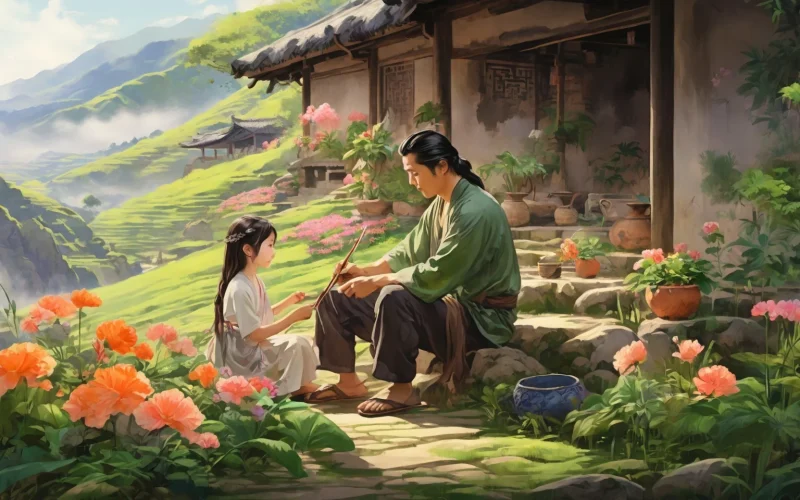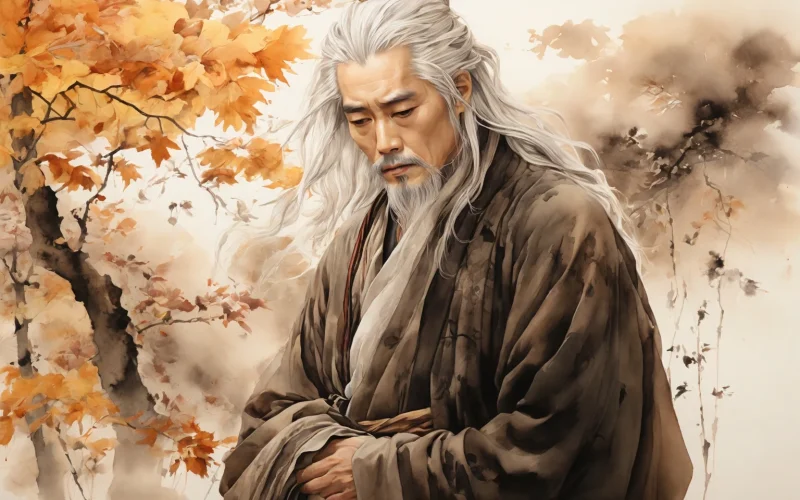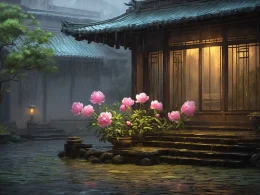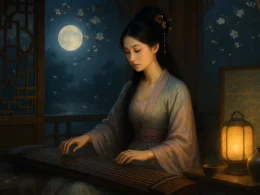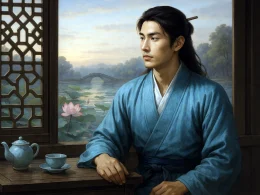Living unsociable behind closed gate,
I care not how four seasons circulate.
When I see fallen leaves along the way,
I sigh for the coming of autumn day.
Gloomy marrows at northern wall vibrate,
And paddy fields in the south undulate.
If I do not enjoy delight, then how
Can I know next year as happy as now?
So I tell wife and children to go out
To climb a hill or wander thereabout.
Original Poem
「酬刘柴桑」
陶渊明
穷居寡人用,时忘四运周。
门庭多落叶,慨然知已秋。
新葵郁北牖,嘉穟养南畴。
今我不为乐,知有来岁不?
命室携童弱,良日登远游。
Interpretation
Written in the autumn of 414 CE (10th year of Yixi reign, Eastern Jin Dynasty) when Tao Yuanming was fifty and living in rural seclusion. Composed during a visit from his friend Liu Chaisang who came down from Mount Lu, this poem depicts the simple contentment of country life while contemplating life's impermanence and the importance of seizing joy in the present moment.
First Couplet: "穷居寡人用,时忘四运周。"
Qióng jū guǎ rén yòng, shí wàng sì yùn zhōu.
In my humble dwelling, few visitors come; sometimes I forget the seasons' turning.
The opening directly conveys the solitude and detachment of reclusive life. While claiming to "forget the seasons," the poet subtly reveals his profound awareness of nature's cycles.
Second Couplet: "门庭多落叶,慨然知已秋。"
Mén tíng duō luò yè, kǎi rán zhī yǐ qiū.
My courtyard filled with fallen leaves, I sigh knowing autumn has come.
Nature's signs awaken seasonal awareness. The falling leaves become metaphors for the passage of time, blending scenery with emotion.
Third Couplet: "新葵郁北牖,嘉穟养南畴。"
Xīn kuí yù běi yǒu, jiā suì yǎng nán chóu.
Young sunflowers lush by north window; fine grain ripens in southern fields.
Vibrant agricultural imagery depicts life's abundance while hinting at its transience - the very richness underscoring time's preciousness.
Fourth Couplet: "今我不为乐,知有来岁不?"
Jīn wǒ bù wéi lè, zhī yǒu lái suì fǒu?
If I don't seek joy today, who knows if next year will come?
A philosophical turn confronts mortality directly. The rhetorical question embodies Tao's characteristically clear-eyed yet optimistic worldview.
Fifth Couplet: "命室携童弱,良日登远游。"
Mìng shì xié tóng ruò, liáng rì dēng yuǎn yóu.
I bid my wife bring our children - on this fine day we'll wander far.
The conclusion transforms contemplation into action. This spontaneous outing exemplifies Tao's philosophy of finding joy in life's simple moments.
Holistic Appreciation
In just ten lines, the poem moves from solitary reflection to communal activity, from seasonal observation to existential meditation. Beginning with apparent forgetfulness of time's passage, the poet progresses through autumn's reminders and nature's bounty to confront life's uncertainty, ultimately choosing present-moment joy. The imagery shifts seamlessly from courtyard to field to philosophical realm, demonstrating Tao's mastery of blending concrete observation with abstract thought.
Artistic Merits
- Natural symbolism: Ordinary elements (leaves, sunflowers, grain) carry profound meaning
- Structural progression: Logical movement from observation to philosophy to action
- Balanced perspective: Clear-eyed about mortality yet celebratory of life
- Conversational tone: Rejects formal poetic conventions for personal expression
Insights
This poem offers timeless wisdom about embracing life's ephemeral beauty. Tao demonstrates how solitude need not mean loneliness, and how awareness of mortality can enhance rather than diminish life's pleasures. His decision to gather family for an impromptu excursion models how we might transform philosophical understanding into lived experience - finding meaning not in grand achievements but in mindful appreciation of ordinary moments. This "carpe diem" philosophy, rooted in agricultural rhythms rather than hedonism, remains profoundly relevant for modern seekers of meaning.
Poem translator
Xu Yuanchong (许渊冲)
About the poet

Tao Yuanming(陶渊明), 365 – 427 CE, was a poet, literary figure, fu writer, and essayist active during the late Eastern Jin and early Liu Song dynasties. Born in Chaisang (near present-day Jiujiang, Jiangxi Province), he pioneered a new genre of pastoral-themed literature, expressing profound philosophical insights through simple language. His poetic style became an enduring aesthetic standard in classical Chinese poetry.







